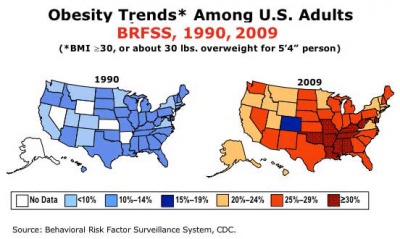Obesity (Overweight)
Obesity (Overweight)
Contents
Definition
Being overweight or obese, is one of the major health problems related to nutrition in the United States today. Obesity is when one's weight is 15% over what is considered average for that person's height and frame. Morbid obesity is when the excess weight is 20% or more above what is considered normal.
A simple guideline to judge what is considered to be normal, overweight or obese is the BMI (Body Mass Index). The body to fat ratio is clarified by using one of these charts. You can determine which category you fall into, by entering your height and weight.
Causes
The main cause of obesity in both children and adults is a combination of overeating and lack of exercise. Excessive ingestion of simple carbohydrates, fatty foods and sugars will definitely lead to excess fat and obesity. It is said that one pound of fatty tissue is equal to 3500 calories.
Glandular malfunction, emotional stress, boredom, bad habits, and an unreasonable love of food, are also common reasons for excessive weight gain. In many cases, people will overeat to compensate for emotional shortcomings, such as lack of love or attention from others. The quality of food that is eaten is also a great contributor, many fast foods and processed foods are high in salt, sugar (high fructose corn syrup/HFCS) and contain unhealthy fats in excessive amounts.
Caloric intake must be comparable to calories that are burned. Calories may be burned up by the basal metabolism, which includes normal bodily functions like breathing and digestion. More substantial amounts of calories can be burned or used up with exercise. When the number of calories used during the day exceeds the amount consumed, the body oxidizes its supply of fat to produce energy, and thereby a reduction of weight results. A daily reduction of 1,000 calories a day, can result in approximately 2 pounds of weight loss per week.
Related Health Conditions
Obesity often leads to health conditions such as heart disease, kidney problems, diabetes, hypertension (high blood pressure), malnutrition, fatty liver, blood clots, Gout, etc. Excessive fat is hard to metabolize, and can upset both liver and kidney function. Extra demands are placed on the function of all organs.
Another complication that can result from being obese is excessive stress on the bones and joints, which can create extreme pain for some individuals. Many overweight people rely on the assistance of a cane, walker or electric scooter for mobility. It's true to say that allowing oneself to become overweight is harmful physically, emotionally and mentally.
Treatment
The best treatment for obesity is to lose weight safely. A sensible diet that includes all the essential nutrients and minerals is required. A high-protein, low-carbohydrate and low-fat diet is usually recommended for safe and gradual weight loss, also drinking water and staying hydrated helps. Becoming more active is key in losing excess pounds. Exercise doesn't need to be extreme to be effective. Simple habits like daily walks can help lose pounds and inches.
Beneficial Nutrients
Following are some nutrients and foods that may be helpful in the treatment of obesity.
- Alpha Lipoic Acid
- Biotin
- Vitamin B complex
- Vitamin B5
- Vitamin B6
- Vitamin B8 (Inositol)
- Vitamin B9
- Vitamin B12
- Vitamin C
- Vitamin E
- Vitamin F
- Calcium
- Coconut
- Lecithin
- Magnesium
- Omega 3
- Protein
- Chromium Picolinate
- Spirulina
- Curcumin
- Grapefruit
- Apple
- Apple Cider Vinegar
- Sardines
- Pumpkin
- Green Tea
Related Discussions
- Why We're Fat
- Vitamin D and Successful Weight Loss
- Weight Loss Tips
- Omega 3 May Prevent Obesity
- Alpha Lipoic Acid Reducing body Weight
- Overcoming Food Cravings

